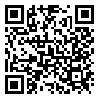BibTeX | RIS | EndNote | Medlars | ProCite | Reference Manager | RefWorks
Send citation to:
URL: http://jcp.khu.ac.ir/article-1-1735-en.html
The Purpose of this study was investigating the effects of the emotion elicitation on the enhancement of the implicit motor memory. To achieve this goal, of the students of Kharazmi University, 40 undergraduate students (20 male and 20 female students), who were accessible, were selected, and then they were divided randomly into two emotional and neutral groups: in each group there was 10 men and 10 women. Serial color matching task was considered for this study. The experiment included two periods: acquisition and remembering period. In the acquisition period, all groups practiced the task for six blocks of 150 trials with the repetitive and random frequency. During the acquisition period, the emotion of a group was aroused by the method of manipulating failure while the other group was in a neutral situation. During the experiment, the changes occurred in the density of the salivary cortisol and anxiety was measured. The Results showed that increasing the emotion of the task could increase the density of the salivary cortisol and anxiety. Furthermore, while the neutral group had no enhancement in SCRT learning during the 24 hours, the emotional group showed substantial enhancement during the same period of time.
Accepted: 2016/06/12 | Published: 2016/06/12
| Rights and permissions | |
 |
This work is licensed under a Creative Commons Attribution-NonCommercial 4.0 International License. |






